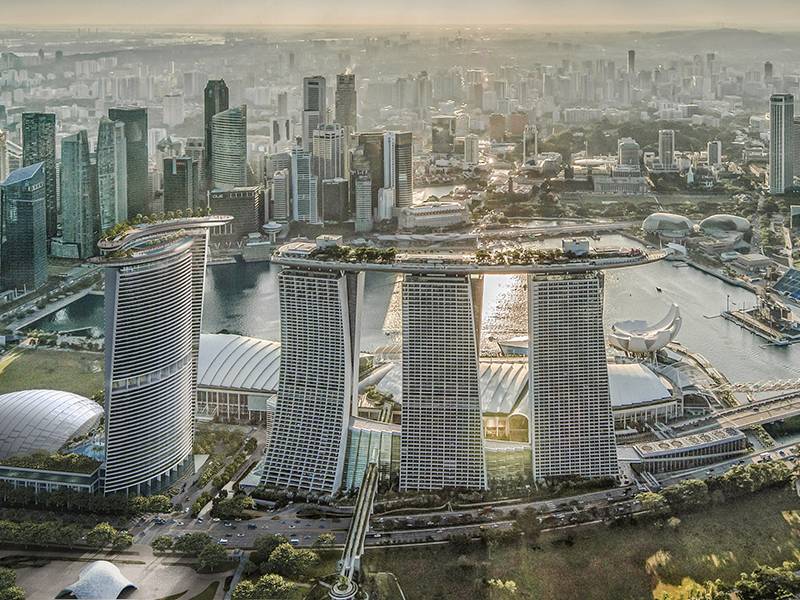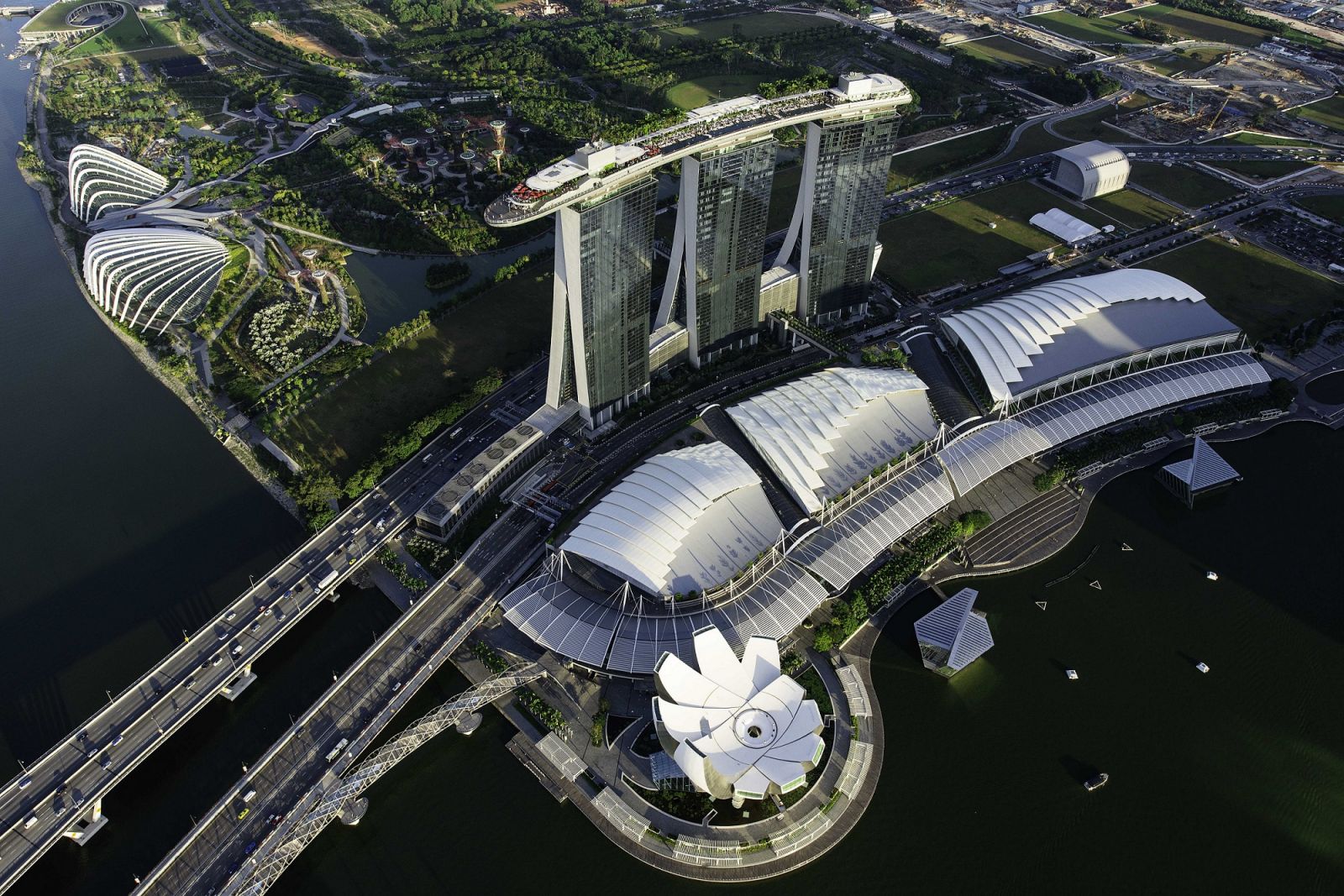“Resilience implies steadfastness, but in MICE you have to be the opposite”

“(...) focus will be further technological development even when we look at this ‘Convening Leaders.’” For Paul Town, senior vice president at Marina Bay Sands (MBS), there are no doubts whatsoever about the playbook to be implemented in this luxurious integrated resort. Strategic partner of PCMA and Singapore Tourism Board (STB) in hosting this annual meeting in Singapore, we asked Mr. Town the reason for this success, the country's place in the MICE market today and the tech wonders for its business.
1) We recently learned of the impressive 80% occupancy rate in your hotel, even with increased government restrictions and limitations. At a time of crisis in the hospitality industry, how did you manage to keep up with such high numbers?
Once the circuit breaker ended (which was our version of the lockdown), we quickly realised that we still had a local market to access. Even though MBS has very much developed as a destination for overseas visitors, the local market is still important for us − it’s actually our third-biggest market by engagement rate right across the property. We really had to pivot a lot of our o erings to target that local market. By positioning ourselves strongly to attract the “staycation” market, as Singaporeans were no longer allowed to travel for holidays. On the other hand, Singaporeans are great shoppers, so cross-retail has also increased, as well as Food and Beverage, since there is a great dining culture. An interesting statistic that we learnt from the STB is that Singapore is actually a huge tourism net exporter. The outbound spend of Singaporeans who travel overseas is actually $29 billion a year. In tourism earnings, Singapore actually makes $24 billion. The last jump on the bandwagon was MICE, because it features these corporate meetings that have been deactivated for a while. But we reimagined a way to do it and eventually, we were able to reactivate them in this hybrid format.
2) MBS launched a state-of-the-art broadcast studio at its Sands Expo CC, offering broadcast quality live-streaming capabilities and hologram functionalities. Talk me through this whole process.
We have always been a leader in technology-driven conferences here, with a very strong AV team to imagine something like this. The virtual events we are holding now are not the first virtual events we ever held. However, we realise that whilst large-scale face-to-face meetings will return, this broadcast studio can play a role in the long term. Thus, we did have something planned at that point with a typical development timeline, where we were benchmarking against television stations, e-sports centres, to see what we are capable of. In the pre-pandemic, we were just pulling for an advanced version of what we’re doing, with enhanced connectivity and better backdrops, but then the pandemic hit and really accelerated our thinking process. So, we probably had been thinking about it for 18 months, to put a task force together that really designed this over 3 months, and to finally build it in a week. We actually had a lot of hardware available, it was really the software and the design that allowed us to create the hybrid studio. That learning and developing are still in an accelerated phase. Whilst we delivered on something that was quite far ahead of what was originally planned, we still know there is a lot more capability in using technologies like augmented reality, mixed reality which could be delivered in a few years.
.jpg)
3) Do you think that Singapore needs to redefine a new proposition value as a MICE hub with this new hybrid factor in place?
Yes, but not as a complete redefinition. It just becomes more part of the lead story now. The world is seeing a couple of things: one of the advantages − forget the pandemic − is being able to have a much bigger reach and potentially monetise those connections. The reason that people would travel to events and conferences before, is because they need connection with impact, they want to do person-to-person transactions. It’s not something they thought they could do over the phone or even via screen − not enough impact nor interaction, the communication wasn’t rich enough. All we know about the time of the various lockdowns in different parts of the world − when we were looking at a screen and making a zoom call − allow me to think that we had it. But when you start to get to this need to enrich content, to communicate with this impact and use backdrops like these, zoom wasn’t going to cut it on its own for years to come. Hence why I think this has come to the front and why I think it has a long-term application. I hope we get back to the same face-to-face numbers that we had, but there will be many more layers of the community that we will be able to reach through this kind of technology.
4) How do you expect your event planning to change in the post-pandemic phase, not only with customer service but also with new safety prevention guidelines?
In terms of safety guidelines, I don’t think they will be all sustained at the same level. There will be lingering community expectations around sanitation and cleanliness. For example, we are currently accredited with “SG Clean” and “Bureau Veritas”, which is really an accreditation system designed specifically to measure the actions around containing, controlling and protecting against Covid-19. I think there are elements of what we did to get these accreditations to be sustained. In particular, around the sanitation of rooms, highly touched surfaces like escalators, handrails and so forth. However, we expect that at some point one will be able to have a dinner with more than 50 people and sit at a table with more than 8 people, without being separated or put into boxes. That is, the social element of the events will be broadened down. So, no, I don’t think every element will remain but some core elements will.
5) How important is for you within the framework of your space, to have multipurpose workers and to diversify the qualifications of your employees?
It has been market-driven and very important for us. We do have a much more diverse offering now. If we look at MICE specifically, the upskilling and cross-skilling of that team has been significant. For example, there is a digital strategy accreditation offered by PCMA for all 52 members of the AV team, who will be able to obtain it by the end of the first quarter of 2021. It might be related to the running of this facility, but it really has an impact across the board. If you look at the strongest labour deployment through MICE previously, it was quite F&B focused because it’s such a labour-intensive area. Now that the high touch service element of F&B is not quite at the same level, that has been scaled back a bit. So, a lot of these team members have been cross-skilled into these tech areas. The ability to run safe events, delivers on the social distancing measures for example. And that is just MICE. We are seeing the same kind of cross-skilling requirements across the board. Some of them also come back as a result of overall reduced fall in demand, so we need to have a more exible workforce to move around, from department to department or from restaurant to restaurant.

6) We are very curious to know about the event industry resilience roadmap that you have adopted here. How is it positively affecting the work of the MBS and Sands Expo for the safe resumption of events?
The MICE industry has always been about adaptability. It’s funny because resilience implies steadfastness, but in MICE to be resilient you have to be the opposite. There are so many pivots that we have to go through to remain relevant and marketable to event planners and the MICE industry, so that resilience is born out of adaptability. That needs to be the theme ongoing. It’s not just about tech − although it’s a massive part of it. It’s also about: has this market started to open up? As the borders open up, it’s bound to be different applications for exhibitors or for delegates from different markets. How do we adapt the facilities to handle that? As we ease out of the pandemic, it is also important to be in step with the ramp up of the market and able to accommodate how quickly demand returns. Because there is certainly pent-up elements to it and we must know how to react to that and deliver safely. These measures that we take should never be set in stone because at some point, the market will define them as too stringent or too relaxed. We need to be responsive to our market.
7) How are these new sustainable policies impacting the MBS structure today?
Sustainability has never really been a buzzword for us, it has always been at the forefront of our thinking and we definitely consider ourselves to be a leader in this area. Our parent company is listed on the Dow Jones Sustainability Index and we are one of the leading sustainable MICE destinations in the world. 20% of the events held here in the past were actually sustainable events, with the first carbon-neutral MICE event in Singapore. In 2020, everything changed. There’s a lot of disposable, we saw increases in waste, but our very strong sustainability team has pivoted as well. They worked very closely in particular with our kitchen team to look at sustainable sourcing. We are at 51% of sustainable seafood sources here, we do a lot of work in managing waste, we diverted around 800,000 kilos of food waste in the last year, etc. On top of that, we have reduced our carbon footprint by 33% since 2012. That focus continues and absolutely remains a focus for us. Has it been diffcult? For some specific elements of sustainability, absolutely. Look at the abandonment of disposable masks that have been processed and sanitised. Through the circuit breaker, we also developed a non-disposable MBS mask that is not disposable for sustainability reasons, provided for free to all of our team members.
Other Articles
About Us
Supported by the Union of International Associations (UIA), the International Association of Professional Congress Organisers (IAPCO) and the Interel Group, the global public affairs and association management consultancy, Headquarters Magazines serve the needs of international associations organising worldwide congresses.















